U2 Producer Daniel Lanois Gives Student a Beautiful Day
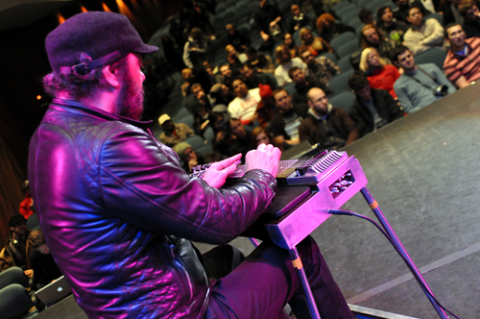
As students walk into the Berklee Performance Center, Daniel Lanois entertains them at the pedal steel guitar.
Photo by Phil Farnsworth
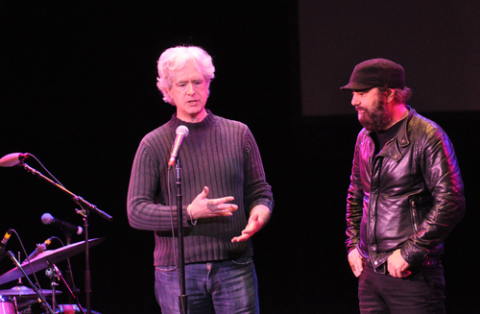
Stephen Croes, dean of the Music Technology Division, introduces Lanois.
Photo by Phil Farnsworth
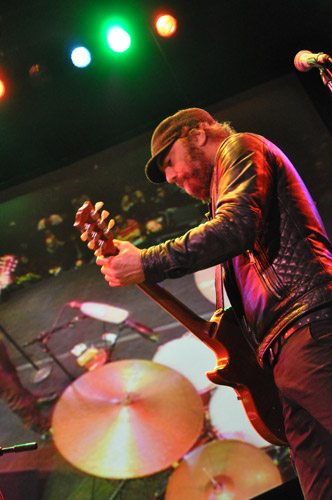
Lanois coaxes a range of sounds from his 1953 Gibson Les Paul.
Photo by Phil Farnsworth
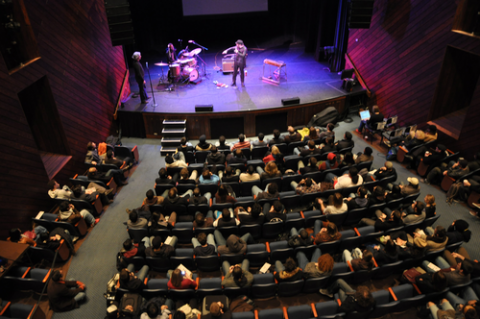
A packed house at the BPC listens to Lanois.
Photo by Phil Farnsworth
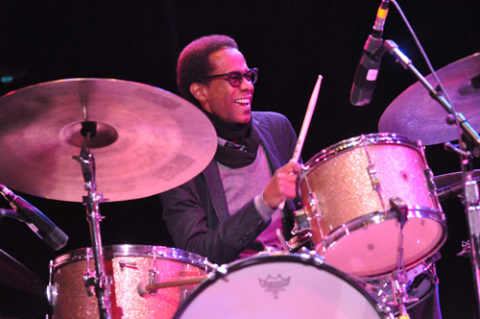
Drummer Brian Blade, in addition to working with Lanois, is a member of Wayne Shorter's quartet, and has played with Joshua Redman, Bill Frisell, Joni Mitchell, and many others.
Photo by Phil Farnsworth
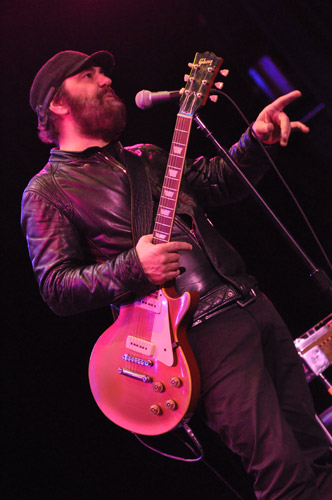
Lanois takes another question.
Photo by Phil Farnsworth
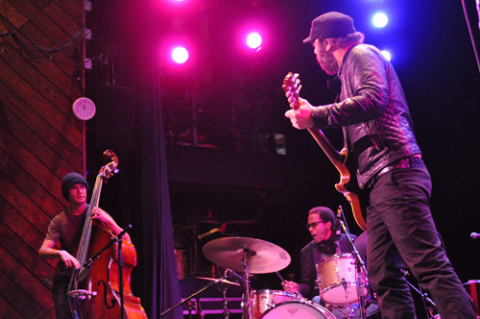
From left, student Justin Richey, drummer Brian Blade, and Lanois perform.
Photo by Phil Farnsworth
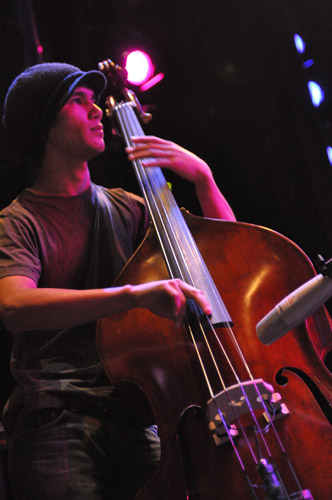
First-semester student Justin Richey enjoys a moment in the spotlight with Lanois.
Photo by Phil Farnsworth
Producer and guitarist Daniel Lanois was about an hour into a November clinic when first-semester bass student Justin Richey headed out of the hall. With his massive instrument slung over his shoulder, Richey got only a few steps from his seat when Lanois started asking him questions.
Within moments, Richey was climbing the steps to the Berklee Performance Center stage and taking his bass out of the case. Apparently, Lanois figured that inviting the young musician to sit in would at least keep him in the room.
"You've got to do something when you're losing your audience," Lanois quipped.
As Lanois called out chords, Richey improvised a part to fit with what he was hearing from Lanois's Gibson Les Paul and Brian Blade's drums. The newly formed trio played two tunes, and Richey played with calm and skill before leaving to thunderous applause from the crowd and congratulations from Lanois and Blade.
Whether it was intended as such or not, the interlude provided an important example of why musicians should be prepared for anything. It's the same principal that Lanois has applied over and over during the course of a career that has made him the go-to producer for giants like U2, Bob Dylan, Emmylou Harris, and Peter Gabriel.
During the two-hour BPC session, Lanois talked mostly about his work as a producer, but when he and Blade played together, it was clear that Lanois, though less well-known than some of his clients, is an extremely talented musician and songwriter. Some of his comments are below. Learn more by clicking through the slideshow.
On Bob Dylan
"He's one of the hardest-working people I know. No dillydallying. It's just coffee, cigarettes, and roll up the sleeves, get to work. You don't want to waste Bob Dylan's time."
On recording Dylan's vocals
"I used a Sony C-37A [condenser microphone] for a proximity sound. You can get real close to the voice and the voice can become the central character of the production. On a couple of his early records his voice sounded like a mosquito. I don't want a national treasure to sound like a mosquito."
On working with coproducer Brian Eno on U2 albums
"We are musicians who bring musical ideas to the production arena. it's hard to know what qualifies as compositional input. Eno can present a new angle, another way of looking at a composition and that's a big part of production. . . ."
"On 'Beautiful Day' it went from sounding like a bar band to having another level. [Eno] gave it a more of a Euro rock 'n' roll feel, a Bo Diddley thing, more Germanic, in the spirit of Kraftwerk."
On "Less Is More"
"One thing that's worked well with me is 'no strumming.' I don't like strumming on records. Maybe there's an exception now and again. My favorite records are lean and mean. That's why I like funk music a lot, because you can really hear the clarity of all the ingredients interlocking. If you strum a lot of acoustic guitar on something, unless you have a really good reason for it, it can get you in trouble real quick, because it just smears all over everything. The same thing can happen with piano playing."
On dealing with studio emergencies
"If there's a bass drum problem, we don't tweak it, we just replace it. Don't waste time in the studio. You can go to a pawn shop and get a bass drum for $100."
